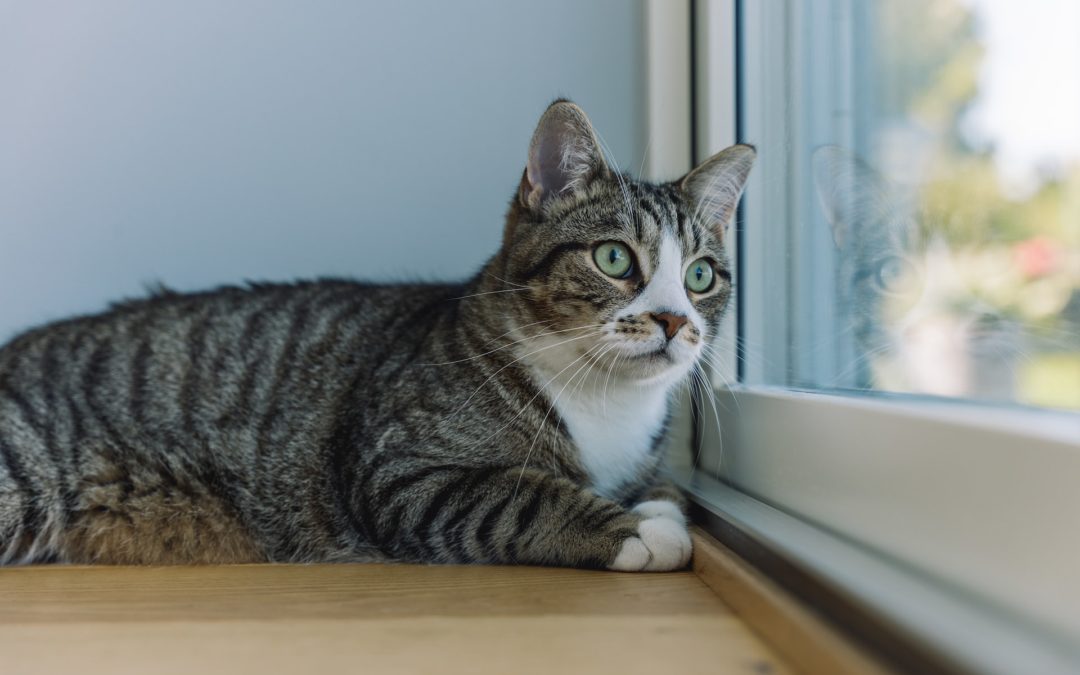There are many things to consider when you adopt a new cat, including whether or not to get them spayed or neutered. Some pet owners assume the procedure isn’t necessary if they only have one cat and plan to keep them indoors.
But there are many benefits of spaying and neutering aside from preventing accidental feline pregnancies. This Spay and Neuter Awareness Month, we’re spreading awareness about how, when, and why you should spay or neuter an indoor cat.
Four Reasons Why You Should Spay or Neuter Your Indoor Cat
1: Prevent Pregnancies
The most obvious reason to spay or neuter your cat is to prevent kittens. Even if you plan to keep your cat indoors, they might still find their way outside at some point and have a run-in with the opposite gender. Cats can have multiple litters a year, and as adorable as kittens are, it’s hard work taking care of a newborn litter and finding loving homes for all of them.
If a male indoor cat gets out and impregnates a stray female, that’s four to six more stray cats in the world. Overpopulation is the leading cause of death in healthy cats, due to shelters that euthanized unclaimed cats.
2: Lower Chance of Escape
Cats are naturally curious, so there’s always a risk of your kitty dashing out the door. But cats that haven’t been spayed or neutered are much more desperate to get outdoors so they can find a mate—especially female cats when they’re in heat. Spaying or neutering your cat reduces their desire to escape, making it easier to keep your indoor cat safe and happy.
3: Prevent Reproductive Cancers
Spaying and neutering are also important for your cat’s health. Spaying helps prevent breast, ovarian, and uterine cancers in female cats. And neutering male cats helps prevent testicular cancer as well as prostate issues like UTIs.
The younger a cat is spayed, the lower their risk of developing a reproductive cancer. For example, a female cat who is spayed before the age of 6 months has a 91% reduction in their risk of mammary carcinoma, while those who are spayed between 6 months and a year have an 86% reduction in risk.
4: Eliminate Unwanted Behaviors
Due to hormonal changes, intact cats can exhibit a variety of behaviors that can be a nuisance for you and stressful for your cat. For instance, female cats tend to yowl constantly for several weeks at a time when they’re in heat.
And male cats like to mark walls, furniture, clothes, etc. with urine to attract a mate. Male cats may also be extremely aggressive because of high testosterone levels. The spay or neuter procedure will make your cat much calmer, without changing their unique personality.
When Should You Spay or Neuter Your Cat?
Whether you have an indoor or outdoor cat, the best time to spay or neuter is when they’re young. Kittens as young as 8 weeks old can safely undergo the procedure, but we recommend waiting until they are at least 16 weeks old. If you want to avoid pregnancies and unwanted behaviors, you should spay or neuter your cat before they turn 5 months old.
Spay and Neuter Surgery in Gilbert, Arizona
Are you ready to spay or neuter your indoor cat? At Anasazi Animal Clinic, we perform safe and effective spay and neuter surgeries for both cats and dogs. We know that many people have concerns about neutering their pets, and we’re always glad to discuss any questions or qualms you may have about the surgery. Call us at 480-497-0505 today to schedule an appointment and make sure that your cat is on track for a happy, healthy life.
Images used under creative commons license – commercial use (2/6/2023). Photo by Hans Ott on Unsplash

